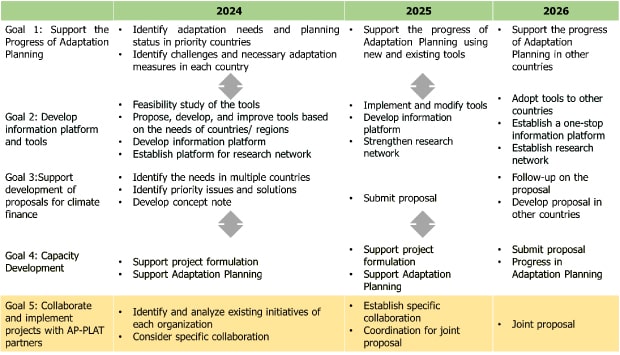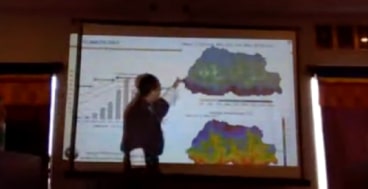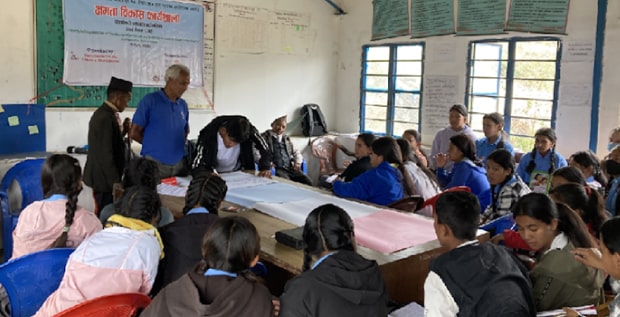  |

The 4th Issue: 5 November 2024 |
 |
| The Asia-Pacific Climate Change Adaptation Information Platform (AP-PLAT) is a partnership on climate change adaptation launched under the lead of the Ministry of the Environment, Japan (AP-PLAT website: https://ap-plat.nies.go.jp/index.html). |
1. Activities and updates |
|
AP-PLAT developed a new Three-Year Action Plan for 2024-2026. This action plan was created in March 2024 to clarify necessary initiatives and future goals to promote adaptation actions in the Asia-Pacific region. It was based on two pivotal framework documents within the AP-PLAT initiative: the AP-PLAT Framework for Action and the Strategy Document for AP-PLAT Capacity Development Program. The AP-PLAT Framework for Action is the strategic blueprint for establishing partnerships and fostering collaborative efforts on critical adaptation issues. The Strategy Document for AP-PLAT Capacity Development Program provides the strategy for capacity-building priority activities. The AP-PLAT Three-Year Action Plan features five goals to leverage the AP-PLAT partnership to contribute to Adaptation Planning in developing countries of the Asia-Pacific region.
 |
|
AP-PLAT was invited by AIT Extension to hold a webinar on how AP-PLAT can facilitate sustainable development by informing nature-based solutions. Researcher Yuki Yoshida from NIES, Japan, gave a lecture on the unrealized potential of Nature-based solutions in the Asia-Pacific and how AP-PLAT helps to address barriers to the realization of this potential. The audience engaged in a hands-on tutorial of ClimoCast and a Q&A session not only on the technicalities of AP-PLAT but also on the societal implications of accommodating uncertainties in the context of climate change.
 |
|
The Regional Resource Centre for Asia and the Pacific at the Asian Institute of Technology (AIT RRC.AP) organized a 5-day Regional Training Workshop on Developing Concept Notes for the Green Climate Fund from17 to 21 June, 2024, in Nadi, Fiji. About 30 participants attended, including resource speakers, representatives of National Designated Authorities (NDAs), officers from relevant national ministries, and representatives of civil society organizations from Fiji, Kiribati, Niue, Papua New Guinea, Solomon Islands, Tonga, and Tuvalu. The workshop aimed to collaboratively define high-quality concept notes to secure climate change funding from the GCF for their respective countries.

Dr. Yuji Masutomi, the head of the AP-PLAT team at NIES, introduced ClimoCast, a tool for rainfall and temperature forecasting based on the latest climate data. In his presentation, Dr. Masutomi emphasized that incorporating scientific climate evidence using ClimoCast would make project proposals more convincing to the GCF. AP-PLAT has the tools to provide evidence-based information grounded in scientific research, and we plan to include proposal support for the GCF in our future scope. This comprehensive program enabled participants to develop GCF concept notes for their countries. Seven country concept notes were successfully drafted using the GCF template. |
Building Climate Resilience in Bhutan: Leveraging AP-PLAT’s Downscaling Methodology for Adaptation and Disaster Management
In an effort to strengthen Bhutan’s ability to manage climate-related disasters, ESCAP, in collaboration with AP-PLAT and partners such as UNDP and ThinkBlue, has made significant strides in delivering precise and localized climate projections. Through a series of joint technical capacity-building workshops, Bhutan’s national stakeholders were equipped with the tools and expertise necessary to handle the challenges posed by climate change.
A key aspect of these initiatives was the use of AP-PLAT's downscaling methodology, taught by Dr. Yuji Masutomi from AP-PLAT. The methodology has been a game-changer for Bhutan. As a small country with diverse geographical regions, the standard 100 km by 100 km scale for climate projections is not granular enough to capture the variability of climate risks. Downscaling projections to a 1 km resolution enables policymakers from multiple sectors in Bhutan to estimate climate change risks at different timescales and scenarios. This high-resolution data provides localized insights into climate exposure and vulnerability, and is now a critical part of Bhutan’s 2024 Climate Change Report on which Bhutan will base its next National Adaptation Plan.
These training sessions also introduced the stakeholders to the ESCAP Risk and Resilience Portal, an initiative to take forward the downscaling through this powerful tool for data visualization and analysis that allows users to explore climate impacts in real-time and evaluate potential responses.

Mr. Ugyen Chopel, (Meteorological Services Division), NCHM, Bhutan presenting the downscaled methodology at the Capacity Development Proposal on DRR and CCA for Disaster Management Officials and Dzongkhag Disaster Management Officers, 10-14 June 2024, Punakha, Bhutan
The training session introduced the Bhutan Portal prototype, a decision-support tool that integrates climate data and disaster management strategies at the subnational and district levels. Officials received hands-on training in scenario modeling, hazard assessments, and vulnerability analyses, equipping them to make informed decisions on disaster preparedness and resource allocation.
Looking ahead, ESCAP is committed to further expanding the use of this methodology across the Asia-Pacific region through the Risk and Resilience Portal, ensuring that other nations can benefit from similar insights and capacity-building initiatives. Collaborative efforts with AP-PLAT, UNDP, and ThinkBlue Data have established a strong foundation for improving climate resilience and disaster management practices in Bhutan and beyond. |
|
The NAP Global Network and the Government of Viet Nam co-organized a 3-day regional peer learning event for Asian-Pacific countries from 10 to 12 September, 2024, in Ha Long City, Viet Nam, on monitoring, evaluation, and learning (MEL) systems for national adaptation plan (NAP) processes. Representatives from Viet Nam (host), Bhutan, Cambodia, Malaysia, the Philippines, Thailand, Tonga, and Timor Leste exchanged experiences about designing and implementing MEL systems for NAP processes and exploring opportunities to strengthen their effectiveness in driving evidence-based climate change adaptation. The NAP Global Network organized this peer learning event through funding from the German Federal Ministry of Economic Cooperation and Development.

The workshop objectives were to develop a shared understanding of the conceptual framing of MEL for NAP processes, foster learning about critical aspects, such as progress reporting, monitoring, and data governance of MEL systems for NAP processes, and co-design a peer learning cohort to meet their needs for capacity building on MEL over the next three years. |
|
APN hosted a project, aimed to strengthen the regional capacity of adaptation communication of Indigenous and local knowledge (ILK) systems across the Hindu-Kush Himalayan (HKH) region. The ILK in the HKH region has been documented and used to develop a comprehensive regional adaptation communication framework and other knowledge products. Such resources have helped raise awareness of the important role of ILK in local climate adaptation and enhanced the capacity of local communities. The project conducted over 15 capacity-building workshops that engaged over 800 participants across multiple countries, including students, researchers, local communities and media professionals. Using community radio programs, nine episodes were shared with an audience of between 100,000 and 1 million across Nepal, India, and Bangladesh. Through these efforts, the project has effectively facilitated the integration of ILK into climate action planning and curriculum development, empowering local communities to communicate effectively about climate change.

To access the policy briefs and other peer-reviewed publications on ILK systems in the HKH region and other information about the project, please visit: https://doi.org/10.30852/p.13085 |
2. Events and Opportunities |
|
The Japan Pavilion hosts events organized by the Ministry of the Environment, Government of Japan (MOEJ) to showcase Japan’s advanced decarbonization technologies and initiatives to the global audience. Among the numerous events available, this newsletter would like to showcase two climate change disaster risk seminars.
The first is "Climate Change Adaptation x Health - Measures to Combat Infectious Diseases Increasingly Threatened by Climate Change". This seminar will provide an overview of the intersection between climate change & health, and present the efforts of a private company to develop effective vaccines against infection, followed by a discussion with experts. One infectious disease, dengue fever, has now spread to more than 100 countries across a wide area in Latin America and the African continent. One of the reasons for the spread is the impact of climate change. Dengue fever is an infectious disease that the World Health Organization (WHO) named as one of the top 10 threats to global health in 2019. However, with no effective treatment, approximately half of the world's population is currently at risk of dengue fever, with an estimated 100 to 400 million people infected each year. Through this seminar, representatives from the public and private sectors, as well as international organizations, will share knowledge and best practices with the audience at the seminar, with the aim of creating possible cross-sector partnerships to develop workable solutions to address the increasing threat of dengue fever amidst climate challenges and health. This side event is planned to be held on 15 November, 11:45-13:00 GMT +4.
The second seminar is "Enhancing EWS Deployment & Further Collaboration in Asia-Pacific." MOEJ is actively working to introduce and deploy the Early Warning System (EWS) to Asia-Pacific countries. The EWS initiative, with MOEJ and Japanese private companies, is working to address various climate change issues in the Asia-Pacific region. At this seminar, the progress and achievements of this initiative will be explained. This seminar will also showcase promising adaptation measures that can create new synergies through collaboration among Japanese private companies in various sectors, such as weather information services, insurance, and finance. In the panel discussion, we will introduce feasible adaptation business models which are considered to promote EWS deployment, and interested countries will provide their perspective. This side event will be held on 16 November, 10:00-11:15 GMT +4. |
3. Introduction to AP-PLAT deliverables and achievements |
|
The integration of the Japan Adaptation Monitoring and Evaluation System (JAMES) into developing countries' National Adaptation Plan (NAP) processes is a significant step towards supporting climate resilience. JAMES is designed for national and local government officers in developing countries seeking to identify challenges and improvements in their efforts. M&E indicators in JAMES can also be used as a "reference guide" for government officers who have just undertaken the adaptation process. Adaptation to climate change takes different shapes and forms, depending on the unique context of a country, region, or organization. Therefore, M&E indicators need to be tailored to the user’s characteristics and situation. JAMES provides each user with the most suitable set of M&E indicators according to the property information entered by the user.

Hands-on training workshops will be conducted in Bhutan and Thailand. Government officials will learn to apply JAMES in the context of their national and local climate adaptation and disaster risk reduction plans. These interactive sessions should provide practical insights into the tool and encourage the development of localized adaptation strategies. Updates about these workshops will be shared on the AP-PLAT platform. |
|
AP-PLAT has embarked on enhancing its database of adaptation case studies. The next update of the AP-PLAT Adaptation Database will expand the platform’s content to provide a more comprehensive resource for policymakers, researchers, and communities across the Asia-Pacific region. By consolidating detailed and practical examples of adaptation measures, AP-PLAT aims to empower policymakers, researchers, and local communities with the tools they need to address climate risks more effectively. The insights gained from these case studies could inform international climate negotiations, supporting evidence-based decision-making. On the ground, strong case studies inspire local adaptation efforts by providing concrete examples of successful implementation, helping to bridge the gap between planning and action. As AP-PLAT’s database grows, it stands to become a central resource for sharing innovative solutions and fostering collaboration among countries in the Asia-Pacific region, ultimately strengthening collective resilience against climate change. Hopefully, the availability of diverse, well-documented case studies can accelerate the learning curve for adaptation initiatives and reduce the time required to implement critical responses in areas most vulnerable to climate change impacts. |
4. Call for your contributions to the AP-PLAT newsletter |
We are seeking the active participation of partner organizations and other stakeholders in AP-PLAT activities to strengthen our network. If you have any events, activity updates, announcements, or other information that you wish to circulate to our community, please send it to the AP-PLAT secretariat by email at [ap-plat@iges.or.jp]. |
Please spread the word! |
If you know anyone who would be interested in AP-PLAT, please forward this newsletter to them and spread the word about AP-PLAT through your community. You can subscribe from this link. |
|
 |
|